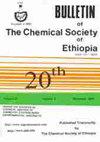使用氧化锌纳米粒子涂层作为镁合金在不同水性电解液中的缓蚀剂
IF 1.3
4区 化学
Q3 CHEMISTRY, MULTIDISCIPLINARY
引用次数: 0
摘要
在这项研究中,采用一种简单的微波辅助技术合成了纳米氧化锌颗粒。结果表明,经物理化学方法测定,合成的纳米颗粒为六方菱锌氧化锌纳米颗粒,晶粒大小为 6.76 nm。在不同的放大倍数下,可以看到不规则聚集的球形海绵状结构。利用傅立叶变换红外光谱,观察到氧化锌表面有相应的官能团。根据吸收测量,直接光带隙约为 3.29 eV。通过寻找红色发射和蓝色带边发射,光致发光光谱可用于检测氧化锌晶格中的晶体缺陷。对氧化锌纳米颗粒的防腐能力进行了研究,结果表明,当这些颗粒涂覆在镁(Mg)基底上时,具有有益的特性。对这些材料进行了带保护涂层和不带保护涂层的耐腐蚀性评估。结果表明,在不同的电解质条件下,涂层明显提高了保护率。与裸镁基板相比,涂覆氧化锌纳米颗粒后电荷转移电阻 Rct 有所提高。关键词:纳米氧化锌;微波辐照;耐腐蚀性;镁合金 Bull.Chem.Soc.2024, 38(2), 417-430. DOI: https://dx.doi.org/10.4314/bcse.v38i2.10本文章由计算机程序翻译,如有差异,请以英文原文为准。
Employing zinc oxide nanoparticle coating as a corrosion inhibitor for magnesium alloys in distinct aqueous electrolyte
In this investigation, zinc oxide nanoparticles were synthesised using a straightforward microwave-assisted technique. Results showed that the synthesised nanoparticles were hexagonal wurtzite ZnO-nanoparticles with a crystallite size of 6.76 nm, as determined by physio-chemical methods. It reveals, at varying magnifications, the irregularly aggregated, spherically shaped sponge-like structure. Using Fourier transform infrared spectroscopy, corresponding functional groups on ZnO surfaces have been observed. According to absorption measurements, the direct optical bandgap is around 3.29 eV. The photoluminescence spectra may be used to detect crystal defects in the ZnO lattice by looking for red emission and blue band edge emission. An investigation into the anticorrosion capabilities of zinc oxide nanoparticles was conducted, which revealed that the particles have beneficial characteristics when coated with magnesium (Mg) substrates. These materials are evaluated for corrosive resistance with and without a protective coating. Results show that coating significantly increased the protection rate under different electrolyte conditions. Compared to bare Mg plate, the charge transfer resistance Rct was increased when ZnO nanoparticles were coated.
KEY WORDS: Zinc oxide nanoparticle, Microwave irradiation, Corrosion resistance, magnesium alloy
Bull. Chem. Soc. Ethiop. 2024, 38(2), 417-430.
DOI: https://dx.doi.org/10.4314/bcse.v38i2.10
求助全文
通过发布文献求助,成功后即可免费获取论文全文。
去求助
来源期刊
CiteScore
2.20
自引率
8.30%
发文量
113
审稿时长
6-12 weeks
期刊介绍:
The Bulletin of the Chemical Society of Ethiopia (BCSE) is a triannual publication of the Chemical Society of Ethiopia. The BCSE is an open access and peer reviewed journal. The BCSE invites contributions in any field of basic and applied chemistry.

 求助内容:
求助内容: 应助结果提醒方式:
应助结果提醒方式:


